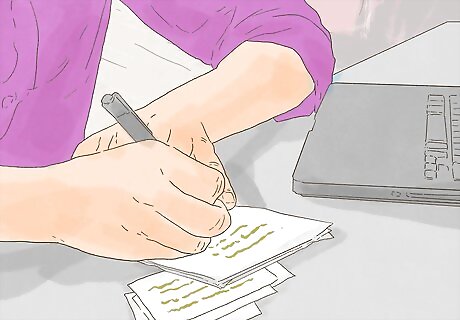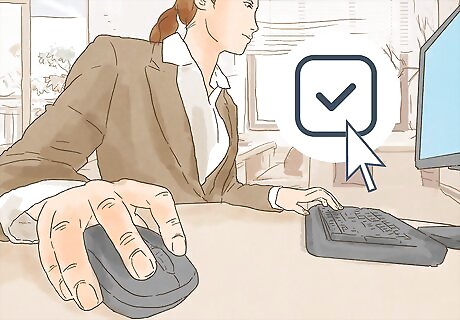
views
Preparing during the Year

Show up mentally and physically for classes. Of course, you must be in class most of the time. However, you also need to pay attention while you're in class. Come prepared to learn each day, so you can absorb what the teacher has to say. Make sure you're getting 7-9 hours of sleep a night so you can be alert during class. If you're still falling asleep, try increasing the amount you sleep each night.

Take notes about what the teacher is saying. If your teacher says it's time to take notes, make sure you're getting things down. Try to write the most important things your teacher is saying, not just every single word. When you try to write down too much, you'll miss a lot of what the teacher is saying. Try to put it in your own words. For instance, if your teacher is talking about a math problem, make sure to get the formula down. You don't need every word the teacher says about it, but you may want to copy down an example. Watch to see what your teacher writes down on the board, as that's likely important. Try comparing notes with a friend after class. You likely got different things from what your teacher said. Take notes by hand when possible. It helps you remember better.

Make time to do your homework every night. You're preparing all throughout the year to pass your SOLs. If you do your homework every night it's assigned, you're learning the material the test will cover. That way, you won't feel the need to cram right before the test. Set aside time each night to finish your homework. Try doing it when you first get home from school, so you have it out of the way. Make out a schedule, and put in time for each class. That way, you know you have time to get everything done. Review your notes from class each day. Make sure you can read what you wrote, and re-write anything that looks too messy. Reviewing your notes after class will help solidify the information in your mind.

Ask about things you don't understand. If you're not understanding something, it's likely other kids aren't either. Don't be afraid to ask your teacher to review something again if you're having trouble grasping it. You could say, "Mrs. Roberts, I'm not quite getting what we went over last time. Can you please spend a few minutes reviewing it again?" Alternatively, ask your teacher if they'll explain it to you after school so you grasp it better. You want to make sure you know a concept when you're learning it the first time so that you're not facing down the SOL and realizing you need to learn something new.

Tell yourself you have the ability to learn anything you set your mind to. If you tell yourself you can't do something, you likely won't be able to. If you tell yourself you can, you're well on the road to accomplishing it. During the year, tell yourself you can do it when you run into homework or a concept you find difficult. When you're feeling frustrated, say, "I can do this. I'm smart, and if I work hard, I will figure this out.
Reviewing for the SOLs

Download TestNav to view practice items. The Virginia Department of Education (DOE) has practice items available on their website. However, you must download software from http://download.testnav.com/. Click on the link, and then hit "Run" or "Install" to start the download process. Follow the prompts on the screen to finish installing the software. You can also download the software from the Windows App. Search for "TestNav."

Access the practice items by navigating through the prompts. First, choose "Virginia" when a list of states pop up. Then, when the sign-in screen pops up, click on "SOL Practice Items" at the bottom. That will allow you to access these items without signing in. Once you're in, choose the area you want to review and the grade level.

Follow the guides for your grade level and test area. The Virginia DOE has PDF guides to instruct you on the practice items. They are listed by grade level and area. Click on the PDF to open it and view the instructions. For instance, these PDFs can tell you how to use the eliminator tool to eliminate answers on your test screen.

Use tests released from the Virginia DOE for easier access. If you don't want to download the software for the practice items, try a released test. These tests are in PDF format, so you can view them on almost any computer. Reviewing these tests will give you an idea of what the real thing will be like, so you can feel more prepared. Pay particular attention to the format of the test so you'll be ready on test day. You can also find released questions at https://education.jlab.org/solquiz/.

Ask your teacher if they can set up a practice test if they haven't already. While you can access these tests yourself, it can be easier if a teacher sets it up for you. You can request that they set up a practice test for you. You could say, "Mrs. Johnson, I'd really like to take a practice test ahead of time so I can see what it's like. Can you set one up for me?"

Review the tests you took this year. The SOL will cover the material you studied in class. One way to review is to look at your exams throughout the year, as they will have covered the most important material. Make sure you understand the concepts on each test. You can also look at any notes that you used to review for your exams.
Getting Ready for the SOLs

Sleep 8-9 hours the night before the test. You need to get enough rest if you're going to do well. Don't try to cram the night before, as you'll only end up tired. Getting enough rest will help you remember what you already know. Getting enough sleep can also help you feel less anxious.

Eat breakfast the day of the test. Breakfast helps fuel your brain. It's hard to think when your stomach is grumbling and you feel a little lightheaded. Try to eat something you normally do so you don't get an upset tummy. Eat something with some protein, such as whole-grain toast and eggs, yogurt and fruit, or peanut butter and toast.

Get to school early so you have a few minutes to relax. If you're late and rushing to school, you're going to feel stressed. Try getting to school 15 minutes early if you can, so you can just clear your head a bit. Ask your parents to take you to school early if they can.
Using Test-Taking Tips for the SOLs

Review the directions before each section. Even if you think you know what the directions are, you should still read them. Things can change, and you want to be prepared. Read the directions word for word.

Read the whole question every time. It can be tempting to skim a question and try to answer it quickly. But, you may miss important information if you don't slow down. Read every word of the question to make sure you understand. Try moving your lips while you're reading to yourself, as if you were reading out loud. Also, check for clues to the answer. Sometimes, part of the answer will be right in the question. For instance, if the question is asking about the dates of the "War of 1812," obviously the dates won't be in the 20th century, so you can mark off any majorly wrong answers.

Look at every single answer. In a multiple-choice question, check out each answer. Read it carefully, and see if it makes sense for the question. If you don't read each answer, you may miss the one that's the best choice. If you just read the first answer, you may find it makes sense for the question. However, it may not be the BEST answer overall.

Mark out the answers you know are wrong. When reading a multiple-choice question, go through the answers one by one. Some answers will be obviously wrong, so mark those out. Then you'll be left with the most likely answers. Physically mark out the answer to make it easier to see which ones are left.

Check your answer against the text for reading questions. If you are answering a question about a passage the test gave you, always go back to the text. Choose your answer, and then go find it in the passage to make sure it's right.

Guess an answer when you can't figure it out. Make sure you've eliminated the wrong answers first. Then, pick the one you think is most likely to be the correct answer. Eliminating wrong answers improves your chances of guessing right.

Get up and move when you have a scheduled break. If you're having trouble paying attention, make sure to walk around a bit or at least stand up and stretch when you have a break. Shake out your arms and legs or even just walk to the bathroom. Moving around can get your brain flowing again when you feel a little stuck.




















Comments
0 comment